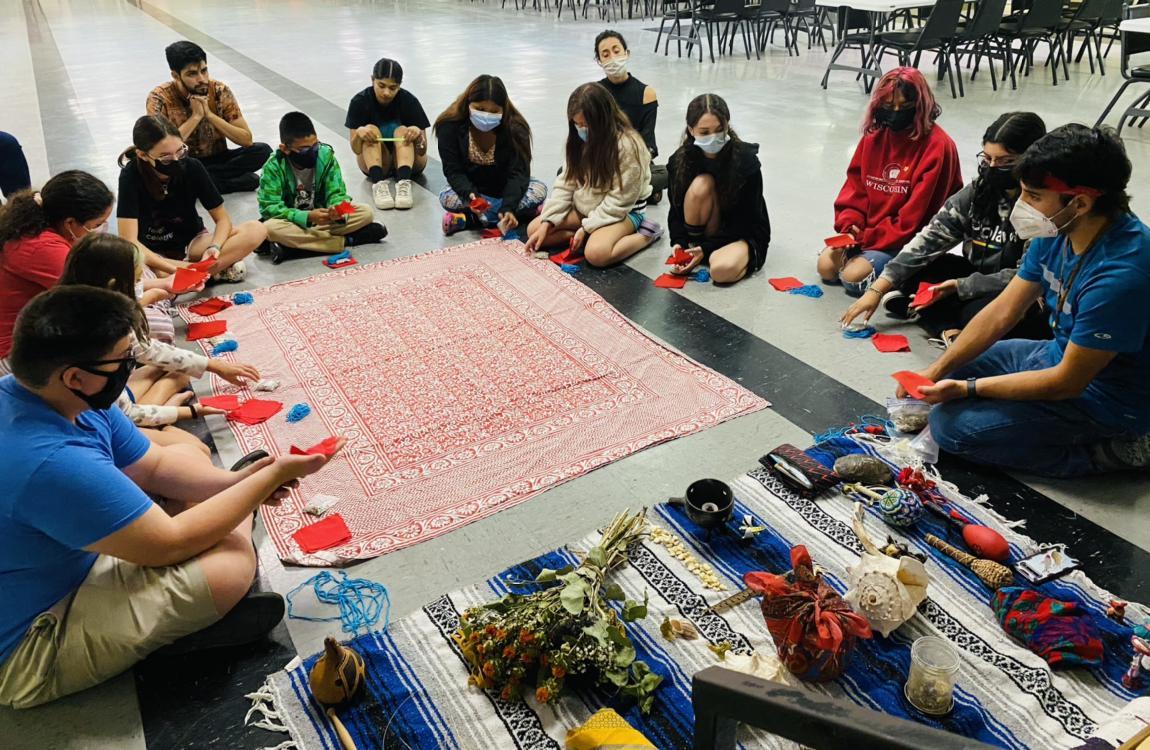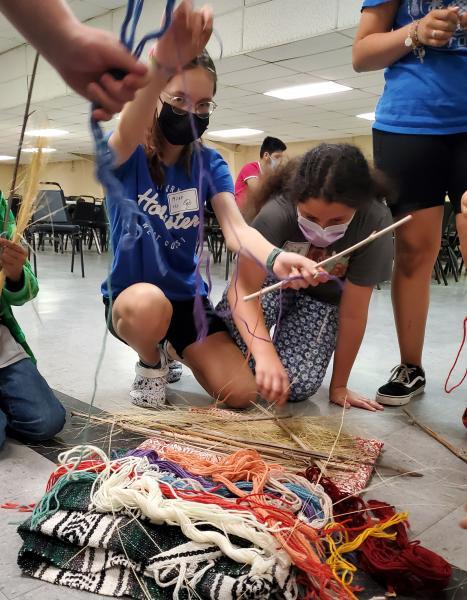
Local students recently took part in the Indigenous Cultures Institute’s 12th Indigenous Arts Summer Encounter at Cuauhtemoc Hall between July 27-July 2. Above, Students learned how to make prayer ties to give as gifts to the ancestors at the reburial grounds. Below, students select materials to make a regalia stick for their performance at the reburial grounds. Photos by Juan Leyva/Courtesy of Indigenous Cultures Institute
Indigenous Cultures Institute hosts summer arts encounter
Local students recently took part in the Indigenous Cultures Institute’s 12th Indigenous Arts Summer Encounter where they participated in daily activities focused on the history, culture, arts and traditions of the indigenous people of this area.
The summer encounter, which took place at Cuauhtemoc Hall in San Marcos between July 27-July 2, provided students an opportunity to learn the Creation Story and food justice. Students engaged in visual arts, music, dance, writing and cooking/nutrition activities. The encounter also introduced students to the Coahuiltecan language which was spoken by Indigenous ancestors who lived and thrived in this area for over 13,000 years.
“Within the history of colonization in Texas, our indigenous identity was stolen from us,” said Maria Rocha, Indigenous Cultures Institute’s Board of Elders member. “We were forced to take on our slave masters’ Spanish names, learn Spanish and forget our language, take on Christianity and leave behind our spiritual belief systems, and give up our lands. When the United States took over, we had nothing to trade for federal tribal recognition as U.S. Indigenous tribes/nations, and eventually became detribalized individuals mislabeled ‘Hispanic.’”

According to the Institute’s website, most of the detribalized people in Texas retained their culture. What is commonly referred to as “Mexican” is actually Indigenous. Texas Hispanics still speak an indigenous language (Nahuatl) within their Spanish (zacate vs. pasto, cuate vs. gemelo, aguacate, zapatos, etc.).
Texas Hispanics also continue to eat Indigenous foods such as corn, squash, beans, tortillas and tamales. Their family structures are expansive and reflect the tribal communities of their ancestors. Their gatherings are ceremonial. Many Hispanics claim their Indigenous heritage and continue to practice ancient ceremonies such as the peyote way, danza, and sweats.
Here in Texas many people labeled Hispanics are reclaiming their Indigenous identity, forming communities and embracing Indigenous ways and values. “We identify as indigenous and work every day to be worthy of this designation,” Rocha said.
Rocha also explained that as indigenous people, they come into this world bearing the responsibility for maintaining balance with Mother Earth. The final day of the weeklong program was a community day, with students and their families participating in a water ceremony at the Sacred Springs and a pilgrimage to the Sacred Springs Reburial Grounds. This served to reconnect and strengthen the students’ relationship with their ancestor’s community values, perspectives, and culture.
“We are appreciative of the support we have continuously received from La Sociedad Mutualista de Cuauhtemoc Board of Directors for providing an important community space to host the Indigenous Arts Summer Encounter,” Dr. Mario Garza said
Cuauhtemoc Hall has been a vital community space for generations of Indigenous families over the last 80 years.
The Indigenous Cultures Institute was founded in 2006 by members of the Miakan-Garza Band, one of the over 600 Indigenous communities that resided in Texas and northeastern Mexico when the Spaniards first arrived. The 83rd Legislature recognized the Miakan-Garza Band as a Texas Indian tribe with “immeasurable contributions to the State of Texas.” Members of the Miakan-Garza Band still practice their traditional ceremonies and maintain long held family ties.
The event was sponsored by the City of San Marcos Arts Commission, Texas Commission on the Arts, Hays County, Hill Country Alliance, Environmental Defense Fund, and public donations.
For more information visit IndigenousCultures.org, Instagram/indigenouscultures, and Facebook/Indigenous.Cultures.Institute.
Information provided by Indigenous Cultures Institute











